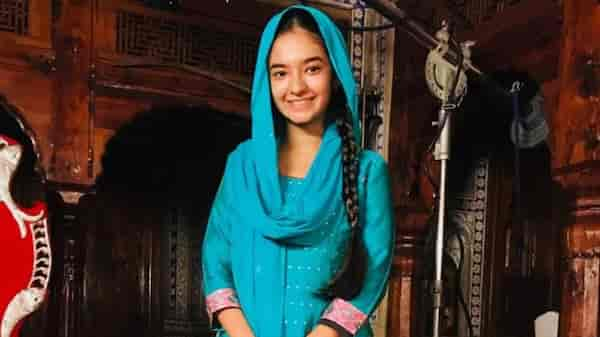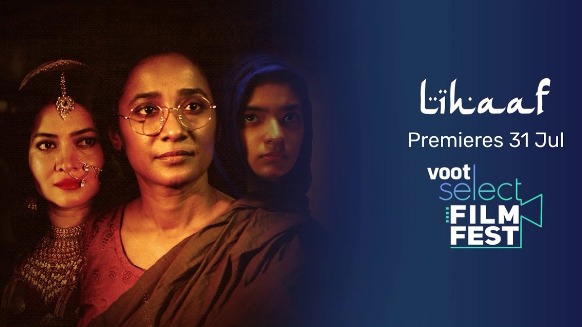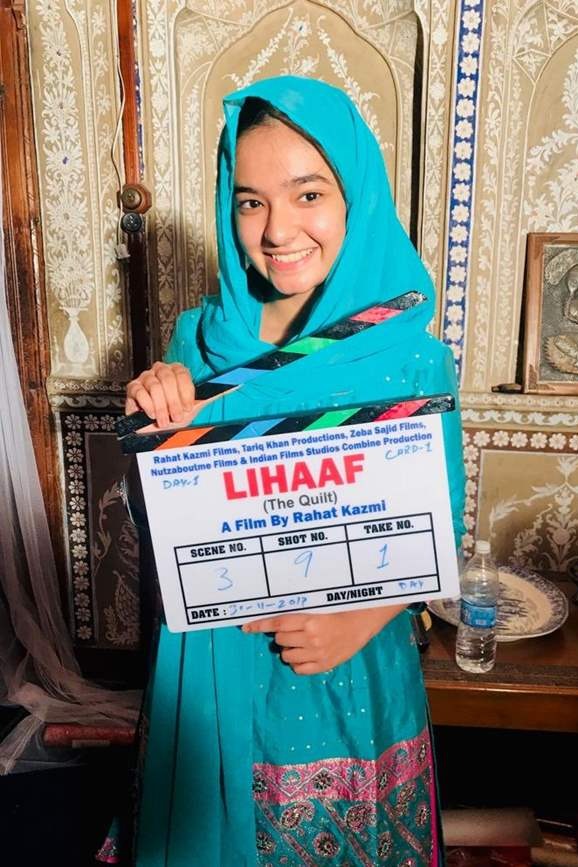Anushka Sen: Naseeruddin Shah did plays but there wasn’t a film on Ismat Chughtai in India before Lihaaf
Anushka Sen spoke to OTTplay exclusively about her film Lihaaf and more.

Last Updated: 10.04 PM, Jul 31, 2021
Rahat Kazmi’s festival film Lihaaf finally released as a part of the Voot Select Film Festival on July 31. The movie stars Tannishhtha Chatterjee in the role of renowned writer Ismat Chughtai while Anushka Sen plays the role of younger Ismat.
We at OTTplay caught up with the actress to discuss the bold project, which Anushka took up at the mere age of 16. Apart from the project, Anushka also spoke about her past and future projects.
Excerpts from the interview:
You have done quite a bold role in Lihaaf. Did you have any apprehensions?
I was 16 when this film was offered to me. It was shot in 2017. The entire concept was pretty new to me as well. I didn't know about the story, but I got to know about her story and how she was. Our director told me that Tanishhtha di will be playing the older version, while I am the young one. It's a very unusual and different film. You don't see such movies usually. I always mentioned that I want to do something different. So I take up roles I find challenging and scripts which leave a different kind of impact on the audience and people can see a different variation to the character. This story is one of them. Ismat Chugtai is one of the greatest writers we've had in our history. Being a woman and a writer at that time was pretty big. There was a lot of male dominance. She was very honest about her writing. She is an inspiration to a lot of writers. We don't know if people are ready or how they are going to react to it but I think that's what we're waiting for. I'm very grateful that I got to play a different character. When people see it, they call it different, new and fresh. People tell me that when they look at me, they see Ismat, which I think is an achievement for me.
What was your first reaction when you heard the script?
I felt it was very interesting and different. I always discuss my projects with my family - mom and dad. We read it together and approach it. Firstly, I saw it as a festival film. I had never done it at that time. Now I have done three festival films. I always saw Cannes Film Festival and hoped that I work in a film which takes me and my project to Cannes. It was my dream, which partially came true. I couldn't go there because of COVID-19, but Lihaaf went there. It actually went across half of the globe and was nominated for so many awards. I just think festival films are very raw and organic. As an actor you learn so much. The first time I shot it, it was a very different experience for me because of how we shoot for TV, series and ad films. Film festivals are also shot very raw. It was very new for me. This was shot without makeup and we had a lot of workshops for the look. I shouldn't look like I'm from the 21st century. A lot of preparation happened. As an actor, the experience I got from the project was a lot. So I'm really grateful to get this project.
You mentioned that you discussed the project with your parents. Did they not discuss the storyline with you once you read it together? How did they approach that topic?
Rahat Kazmi sir told me about the story. Later my parents also told me about Ismat Chugtai. They told me about Lihaaf. I did a lot of research, just like I did with Jhansi Ki Rani. I was trying to acquire as much knowledge about Ismat as possible from my parents, internet, books. Somebody told me about a play on Ismat. One of these plays are portrayed by Naseeruddin Shah sir and his family. I got to know that there are plays available on her already in India and people are watching it. It just hasn't been available in a film format. That's the reason we actors came together and the director said that we need to make a film that will make the round of film festivals and then finally, it can release in India for people to watch. All our dreams are coming true. I remember going to Singapore Film Festival and the reviews were incredible. I was in a theatre with the critics of Singapore. I was really nervous about how they were going to react. I remember the film was over and everybody gave us a standing ovation. Everybody acknowledged and appreciated my work. The journey of Lihaaf has been incredible. I find myself fortunate enough that it's coming to India and people can watch it.

Did you happen to work with Tannishtha, considering you are playing a younger version of Ismat while she plays the older one?
No, unfortunately I couldn't work with her. We played the same character so we never shot together. It was shot in different places too. I finished my part in Kashmir, while she shot in Jammu and Mumbai. I couldn't work with her but we did workshops and meetings together. We got to know each other because we had to look the same way. When you see the film, you get to see that I have grown up to be her. You can't feel that we are two different people who are acting it. That's the fun of the film. Festival films are so real and organic. Tannishtha used to observe so much. I remember Rahat Kazmi sir telling me that they would show her my clips too so that when we act, it looks like we're both one people. It was a great experience.
You have been a child artist so virtual studies have always been the case for you. Was it still tough to manage between shoots and studies?
My school was really supportive. I really miss it. I'm in college now and talking about school really makes me emotional. My principal ma'am and teachers were always supportive of my career. I should give them credit because they have always been with me and told me that I can balance both. My parents always motivated me. They made sure I don't leave out on education because it's important. I have been acting since I was nine. I never missed out on my school life. I would go there and have fun with my classmates as and when I could. I studied a lot. Overall, I had a really great school life. I used to study at home - being up all night. It was really difficult and still is, but that's happening. I really want to continue my studies with my career.
Are child actors treated differently on sets? If yes, what has been your reaction to that?
Definitely. There are projects like my recent being Khatron Ke Khiladi. I was the youngest contestant on the show. Nobody has come near my age. Everybody was more experienced and I was the most pampered kid on set. It felt like I was 13. Everybody took care of me in the sense that I eat right, don't miss out on my breakfast or meals and sleep right. Everybody was there. I really loved them. I had amazing bonds with everyone so I was really happy. It was an incredible experience, but when it comes to work, even if you are the youngest, you have to be really responsible. You have to give your best and not let down your audience. There they don't see your age but acting.

Did Balveer and Jhansi Ki Rani open up more opportunities for you in terms of projects?
Absolutely. Every project has a meaning - it gives you a different kind of boost. My first show was Mahadev. It was my first ever show where people recognized me as 'Choti Parvati,' you know? That was a step for me and then came Balveer which was another huge step. It went on for four years. People started recognizing us and it became a trend. The show was one of the most known shows in India and Indonesia. Then came Jhansi and other projects. Lihaaf is a different part of my life. This is International. It has gone to so many festivals. Every project has given me so much love from my fans.
How would you say working on a film is different than working on TV?
All the mediums - whether TV, web shows or ads are different from films and each other. It differs in how it's shot and how the character is approached. All my festival films are shot without makeup. They are natural, organic and the shots are also taken in a different way. I am learning filmmaking so I would work closely with Rahat Kazmi sir just to learn about the festival. I assisted him in Lihaaf also and learnt so much. I assisted on TV shows too. I always liked to learn what is behind the camera, as much as I love being in front of the camera. It gives you a different perspective and point of view. It's just a lot of hard work. The timeline is different. During TV, you get a reaction every week. When it comes to festival films, it is shot at a certain pace, edited at another pace and when it comes back, you see how people are reacting to it. It then wins awards. I'm just really happy as an actor to get all the experiences at this age.
Lihaaf would have probably not existed if there were OTT censorship. What are your views on that?
OTT has come in India recently. It's great because now people have more options. You cannot go to theatre to watch a movie anyway. Now there's OTT and different kinds of cinema films. It is divided also as under and above 18 years. People who like comedy or thriller also have an easier option. OTT is a great platform where people can watch something of a really good quality. You can see Lihaaf and other critically acclaimed films in the Voot Select Film Festival itself. I'm just really fortunate to come with all of these actors. I saw my photo in the newspaper alongside these big actors. OTT is the platform where I can showcase different sides. They saw me doing Khatron and now in a different role in a critically acclaimed film Lihaaf. I feel really honoured.
What are your upcoming projects apart from the two festival films?
I completed a web series. I'm really excited for that. It is a different role again. I also have some music videos in line. Given the pandemic, we're careful about when to shoot them.

 Premium
Premium